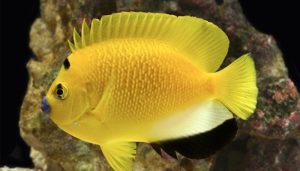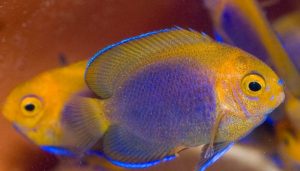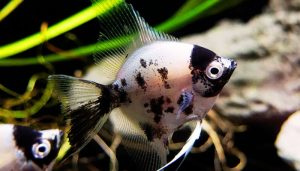Have you noticed your beloved betta fish looking unusually round or struggling to swim comfortably? A bloated stomach in betta fish is not just a minor cosmetic issue—it’s a sign that something might be wrong beneath the surface.
Whether you’re a new aquarist or an experienced hobbyist, understanding the causes behind a betta fish bloated stomach is crucial to safeguarding its health.
This condition can appear suddenly, leaving you puzzled and worried about your little aquatic friend. But don’t fret! By identifying the root cause and acting swiftly, you can help your betta recover and thrive once again. So, why is my betta fish’s stomach bloated?
If your betta fish is bloated, it could be due to various factors, including overfeeding, constipation, internal parasites, dropsy, tumors, or poor water quality.
Each of these issues can affect your fish differently, requiring specific remedies and preventive measures.
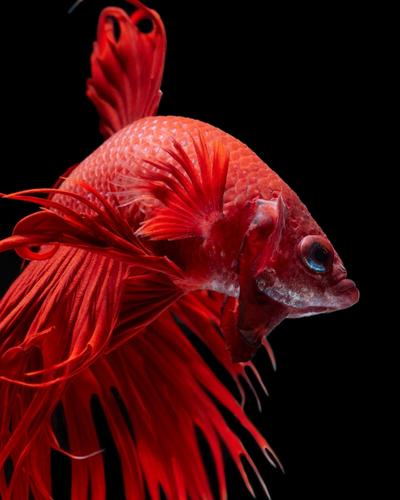
For instance, overfeeding and constipation often result from a diet high in processed pellets, while poor water quality can create a stressful environment that weakens the fish’s immune system.
Recognizing these potential causes early can make all the difference in ensuring your betta’s swift recovery and long-term health. Stay with us as we dive deeper into identifying and addressing the root problems behind this troubling condition.
In the following sections, we will discuss the symptoms, causes, and quick fixes for bloated belly betta fish to help you better understand and care for your pet.
Table of Contents
ToggleWhat Is Bloat in Betta Fish?
Bloat in betta fish is a common condition caused by fluid retention in the Fish’s body. It can be identified by the Fish’s swollen belly, raised scales, and a loss of appetite.
Bloat is often a symptom of an underlying health issue, such as bacterial or parasitic infections, poor water quality, or a compromised immune system.
Betta fish with bloated belly may also exhibit lethargy and Difficulty swimming. Addressing the underlying cause of bloat is essential to treat the condition effectively.
This may involve improving water quality, administering medication to treat Siamese fighting fish bloated stomach, and providing a balanced diet to boost the Fish’s immune system.
In severe cases, a vet specializing in fish health may need to be consulted. To prevent bloat in betta fish, it is essential to keep your betta tank clean, maintain proper water parameters, and feed them a varied and nutritious diet. Regularly monitoring the Fish’s behavior and physical appearance can also help detect any signs of bloating.
Why is my Betta Fish Bloated?
Why does my betta fish have a bloated stomach? There are several potential reasons why your Betta fish may be bloated. One common cause is overfeeding, leading to constipation and bloating in Fish. Another possibility is a bacterial or parasitic infection, which can cause bloating and other health issues in Betta fish.
Poor water quality or temperature fluctuations in the tank can also impact your Fish’s digestive system and lead to bloating. Additionally, some Betta fish are prone to developing swim bladder disease, which can result in bloating and Difficulty swimming.
It’s essential to monitor your Betta fish’s diet, water conditions, and behavior to identify the cause of the bloating betta fish and take appropriate action to address the underlying issue. Consulting with a veterinarian specializing in fish health may also be beneficial in determining the best course of action for your bloated Betta fish.
Causes of Constipation in Betta Fish:
Why is my betta fishs stomach bloated? A bloated Betta fish can be a worrying sight, but the good news is that there are several possible causes, some of which are easily treatable. Here are the most common culprits:
- Overfeeding: This is the most likely reason for your Betta’s bloating. Bettas are greedy eaters and will often overeat if given the opportunity. Aim to feed them as much as they can eat in 2-3 minutes, once or twice a day. Fasting for a day or two after noticing bloating can also help.
- Constipation: Just like us, Bettas can get constipated, especially from a diet lacking fiber. If your Betta hasn’t pooped in a while, this could be the cause. A pea-sized piece of boiled and skinned pea can help get things moving.
- Swim Bladder Disease: This condition affects the Betta’s ability to control their buoyancy and can cause them to appear bloated. It can be caused by overfeeding, constipation, or bacterial infections. If your Betta is struggling to stay upright or sinking to the bottom of the tank, this could be the cause.
- Dropsy: This is a severe bacterial infection that causes fluid to build up in the body, making the Fish appear bloated and pinecone-shaped. Dropsy is often fatal, so it’s essential to seek veterinary help immediately if you suspect this condition.
- Other causes: Less common causes of bloating include egg binding in female bettas, parasites, and tumors.
Here are some additional tips for diagnosing and treating a siamese fighting fish bloated stomach:
- Observe your Betta’s behavior: Are they lethargic or swimming erratically? Do they have any other symptoms like loss of appetite or Difficulty breathing?
- Check your water quality: Poor water quality can contribute to health problems, so test your water and ensure it’s within the optimal range for Bettas.
- Consult a veterinarian or experienced fishkeeper: If you’re unsure about the cause of your Betta’s bloating, it’s always best to seek professional help.
Remember, early diagnosis and treatment are critical to a successful recovery. Good luck with your Betta!
Causes of Dropsy in Bettas
Dropsy in bettas, also known as fish tuberculosis, is often caused by a bacterial infection. This can occur due to poor water quality in the Betta’s aquarium, which can compromise the Fish’s immune system.
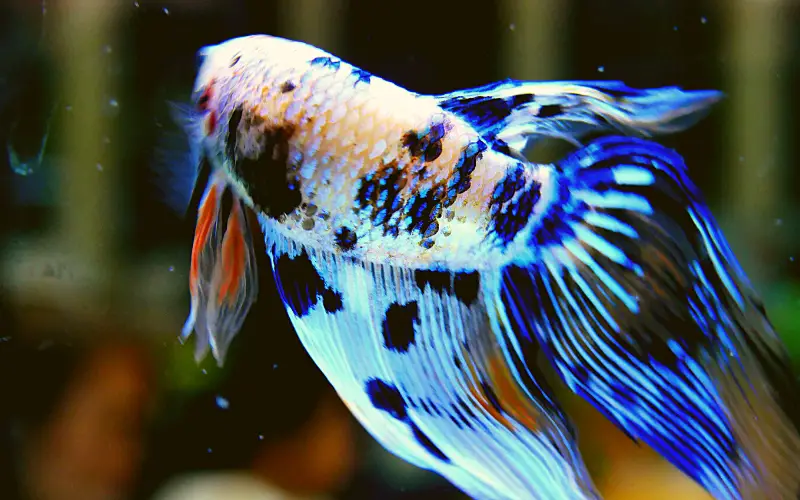
Overfeeding can also contribute to Dropsy, as uneaten food can lead to a buildup of harmful bacteria in the tank. Stress and overcrowding in the aquarium can also make bettas more susceptible to Dropsy.
Genetic factors and pre-existing health issues can also play a role in developing Dropsy in bettas. It is essential for betta owners to regularly clean and maintain their aquarium, avoid overfeeding, and provide a healthy environment to minimize the risk of Dropsy in their Fish. If a betta does develop Dropsy, it is crucial to seek veterinary care as soon as possible.
Can Overfeeding Your Betta Fish Kill It?
Yes, unfortunately, overfeeding your Betta fish can kill it. While they might seem like enthusiastic eaters who gobble up anything you give them, it’s important to remember that their stomachs are tiny, and they don’t need much food to stay healthy.
Here’s why overfeeding can be harmful:
- Digestive issues: Bettas can’t overeat like humans and digest large amounts of food. This can lead to constipation, bloating, and swim bladder disease, which can all be fatal if left untreated.
- Water quality: Excess food decomposes in the tank, releasing ammonia and other toxins that can poison your Betta. Poor water quality can also stress your Fish and make them more susceptible to diseases.
- Obesity: Just like us, Bettas can become obese if they overeat. This can put a strain on their organs and shorten their lifespan.
So, how much should you feed your Betta Fish? A good rule of thumb is to give them as much food as possible in 2-3 minutes, once or twice a day. If you need more clarification, it’s always better to err on the side of caution and give them less.
What Does a Bloated Betta Fish Look Like?
A bloated betta fish will have a visibly swollen belly larger than usual. This bloating can make the Fish appear rounder and more lethargic than usual. The stomach may also protrude noticeably on the sides, giving the Fish a somewhat unbalanced appearance.
The bloated belly may also cause discomfort and make the Fish more prone to buoyancy issues, making it challenging to swim correctly. In severe cases of bloating, the scales on the Fish’s belly may even appear to be stretched and protruding.
It is important to note that bloating in betta fish can be a sign of underlying health issues such as constipation, infection, or organ failure, so it is crucial to monitor the Fish closely and seek veterinary assistance if necessary.
The prognosis for Fish With Dropsy
The prognosis for a fish with Dropsy can vary widely, depending on several factors:
- The severity of Dropsy: Early-stage dropsy with mild swelling might offer a better chance of recovery than advanced cases with severe bloating and organ dysfunction.
- Underlying cause: Identifying the root cause of the Dropsy is crucial for successful treatment. Bacterial infections, parasitic infestations, liver problems, and kidney disease can all lead to Dropsy, each with varying treatment options and success rates.
- Species of Fish: Certain species might be more resilient to Dropsy or better respond to specific treatments. Consulting a veterinarian or experienced aquarist familiar with your Fish’s type can provide valuable insights.
- Promptness of treatment: Early diagnosis and immediate intervention are vital for improving the chances of recovery. Delaying treatment can significantly worsen the Fish’s condition.
- Quality of care: Providing a clean, stress-free environment, appropriate water parameters, and high-quality freeze dried food during treatment is crucial in supporting the Fish’s recovery.
- The overall health of the Fish: A strong, healthy fish is generally more likely to fight off the underlying illness and bounce back from Dropsy.
While Dropsy can be a severe condition, early detection and proper treatment can offer hope for survival. However, it’s essential to manage your expectations. Even with optimal care, the survival rate for Fish with advanced Dropsy might be low.
Can Betta Fish recover from swim bladder disorder?
Betta fish can sometimes recover from swim bladder disorder with proper care and attention. Swim bladder disorder is often caused by overfeeding, poor diet, poor water quality, or constipation, so addressing these factors is crucial for a betta fish’s recovery.
It is essential to regulate Betta’s diet, ensuring they are not overfed and consuming a balanced and nutritious diet. Additionally, maintaining clean and adequately filtered water in the betta fish’s tank is vital for their overall health and can aid in their recovery from swim bladder disorder.
If a betta fish suffers from constipation, feeding them boiled and skinned peas can help alleviate the issue. Providing a stress-free environment with appropriate water temperature and regular water changes is also essential for their recovery.
With proper care, many betta fish can recover from swim bladder disorder and resume their everyday, healthy lives in their tank.
Symptoms of Swim Bladder Disease in Betta Fish
Swim bladder disorder is a general term for any problem that affects a fish’s swim bladder, an organ that helps them maintain buoyancy and balance. Betta fish with swim bladder disease symptoms include:
- Difficulty swimming upright, often tilting to one side or floating upside down
- Loss of appetite
- Lethargy
- Clamping of fins
Treatment for swim bladder disorder will vary depending on the cause. A veterinarian may prescribe medication if home remedies are ineffective or the reason for the SBD is bacterial or parasitic.
The prognosis for betta fish with swim bladder disorder is guarded. Early diagnosis and treatment are essential for improving the chances of recovery. The condition may be chronic in some cases, and the Fish must be managed with supportive care.
How Do You Treat A Bloated Stomach Betta Fish?
A betta fish with bloated stomach can be problematic, but you can help your little buddy feel better with the correct information. Here are some steps you can take:
Identify the cause:
- Overfeeding: This is the most common cause of bloating. Bettas have small stomachs, and even too much food can cause problems. Consider their stomach size to be about the size of their eye.
- Constipation: Lack of fiber in the diet or inadequate water flow can cause constipation.
- Swim bladder disorder: This can be caused by environmental factors like poor water quality or physical injuries.
- Bacterial infection: Dropsy, a bacterial infection, can also cause bloating and pineconing (scales sticking out).
Initial betta fish with bloated stomach treatment:
- Fasting: Stop feeding your Betta for two to three days to allow their digestive system to rest.
- Epsom salt bath: Prepare a separate container with one teaspoon of Epsom salt per gallon of clean, temperature-adjusted water. Dip your Betta for 5-10 minutes, then place them back in their original tank. Aquarium salt can help with constipation and relax the muscles.
- Water changes: Perform small, frequent water changes (25-30%) in your Betta’s tank to improve water quality. Ensure proper water temperature and filtration.
Additional measures:
- Diet: After fasting, introduce a high-quality, varied diet. Include betta pellets, bloodworms, brine shrimp, and daphnia. Offer shelled peas to promote digestion.
- Environment: Check your water parameters (pH, ammonia, nitrite, nitrate) and ensure they are within optimal ranges for bettas. Provide hiding places and plants for stress reduction.
Seeking professional help:
- If your Betta shows no improvement within a few days, or if they exhibit other symptoms like pineconing, loss of appetite, or Difficulty swimming, seek professional help from a veterinarian or experienced fish store owner. They can diagnose the exact cause and recommend appropriate medication or further treatment.
Siamese Fighting Fish Bloated Stomach (Quick Fix)
A bloated stomach in Siamese Fighting Fish (Betta fish) is often caused by overfeeding, constipation, or underlying health issues like dropsy. Here’s how to address it:
- Stop Feeding: Pause feeding for 1-2 days to allow their digestive system to clear.
- Use a Pea: Feed a small portion of a boiled, de-shelled pea to relieve constipation. Avoid this if dropsy is suspected.
- Epsom Salt Bath: Prepare a separate tank with 1 teaspoon of Epsom salt per gallon of water to reduce swelling and ease digestion. Limit the bath to 10-15 minutes.
- Monitor Water Quality: Ensure clean, warm water (76–82°F) with proper filtration to reduce stress.
- Check for Dropsy: If the scales are pineconing, this could indicate dropsy, requiring immediate attention with medications like antibiotics or antibacterial treatments.
Act quickly and monitor your fish closely to prevent the issue from worsening.
Bloated Betta vs. Dropsy – How to Tell?
It can be challenging to tell the difference between a bloated betta and a betta with Dropsy, but there are some key signs to look for.
Bloating is usually caused by overfeeding or constipation. A bloated betta will have a rounded abdomen, but their scales will lie flat against their body. They may also be lethargic and have Difficulty swimming.
Dropsy is a more severe condition that is caused by an underlying illness, such as a bacterial infection or organ failure. Bettas with Dropsy will have a swollen abdomen that may appear pinecones as their scales stick out from their body. They may also have Difficulty breathing, popeye (bulging eyes), and pale gills.
Here is a table that summarizes the key differences between bloating and Dropsy:
| Feature | Bloating | Dropsy |
|---|---|---|
| Cause | Overfeeding, constipation | Bacterial infection, organ failure |
| Appearance of abdomen | Rounded | Swollen, pineconed |
| Scales | Flat | Sticking out from the body |
| Other symptoms | Lethargy, difficulty swimming | Difficulty breathing, popeye, pale gills |
If you are unsure whether your Betta has bloating or Dropsy, it is always best to avoid caution and consult a veterinarian or fishkeeper. Early diagnosis and betta fish with bloated stomach treatment can improve the chances of your Betta’s recovery.
Commonly Asked Questions about Malawi bloat and Dropsy causes in Betta Fish (FAQs)
How do you treat a bloated betta fish?
Fast your Betta for 1-2 days, then offer high-fiber foods like shelled peas. Improve water quality with 25% daily changes. Seek a vet if bloating persists or if the Fish shows other symptoms.
Why does my Betta have a fat belly?
A betta’s belly can appear plump for several reasons. Overfeeding, constipation, internal parasites, or Dropsy are potential causes. Observe for other symptoms like lethargy or trouble swimming to determine the best action.
How do you treat an overfed betta fish?
To treat an overfed betta fish, fast it for 1-2 days to allow digestion. Gradually reintroduce a balanced diet of high-quality betta pellets and live foods such as mosquito larvae. Ensure proper water conditions and monitor health.
Is there a cure for Dropsy in betta fish?
Unfortunately, there’s no guaranteed cure for Dropsy. Early intervention with supportive care & antibiotics can offer hope, but consult a vet as it’s often fatal.
Can Dropsy be reversed?
Reversing Dropsy in betta fish is challenging, but early detection and aggressive treatment can offer a glimmer of hope. Unfortunately, Dropsy is often a symptom of a severe underlying issue, making it difficult to cure fully.
How do I get rid of Dropsy in my fish tank?
Eradicating Dropsy is challenging, not impossible. Isolate sick Fish, improve tank water quality with frequent changes, and consider antibiotics for individual Fish. Unfortunately, once advanced, Dropsy often proves fatal. Consult a vet for the best betta fish with bloated stomach treatment options.
Can a fish survive Dropsy?
The survival of a fish with Dropsy is uncertain. Dropsy often indicates severe internal issues, and while treatment may help, the prognosis is guarded. Consult a vet or aquarium expert for guidance.
Can Dropsy cure itself?
Unfortunately, Dropsy rarely self-cures in Fish. While mild symptoms may temporarily recede, the underlying cause will persist, often internal imbalances or infections. Early intervention and expert care offer the best hope for recovery.
How can I get my betta fish to lose weight?
Fast for 1-2 days, then offer high-fiber foods like peas & reduce pellet feedings. Improve water quality with daily changes. Seek a vet if no improvement or other symptoms arise.
What happens if you accidentally overfeed a fish?
Overfeeding Fish can lead to water quality issues, increased ammonia levels, and stress. It may cause health problems, such as SBD, impacting the well-being and survival of Fish.
What Fish don’t get along with bettas?
Bettas are aggressive tank mates; avoid housing them with fin-nipping Fish like guppies, other male bettas, and brightly colored or long-finned species. Choose compatible, non-aggressive companions for a harmonious aquarium.
Why is my female betta fish bloated?
A female betta fish bloated stomach could be caused by overfeeding, constipation, dropsy, or egg binding. Monitor her behavior, adjust feeding, and consult a vet for persistent bloating.
Conclusion
If your betta fish is bloated, it may suffer from a potentially serious health issue. A betta fish bloated stomach can be caused by a variety of factors, including overfeeding, constipation, swim bladder disorder, or even a tumor. It’s essential to monitor your betta fish closely and take action if you notice any signs of bloating betta fish. One possible solution is to fast your betta fish for a day or two and then offer a diet of cooked and skinned peas, which can help digestion.
Additionally, ensure that your betta fish’s water is clean and properly maintained, as poor water quality can exacerbate digestive issues. If the bloating persists or worsens, it’s best to consult a veterinarian or a fish health expert for further advice and treatment options. Remember, a bloated stomach betta fish is often a sign of a more significant underlying issue, so it’s crucial to address it promptly to ensure the health and well-being of your beloved pet.
You might also like
- Overfeed Betta Fish 101: Recognizing Symptoms and Quick Fix
- Can Betta Fish Eat Tropical Flakes! (3 Better Alternatives)
- Dropsy or Constipation Betta: Here’s 3 apparent Differences
- Betta Swim Bladder Disease: (7 Symptoms & Best Treatment)
- Betta Fish Dropsy: Symptoms & Causes (5 Proven Curing Tips)
- Pineconing Betta Fish Diseases (5 Symptoms & Best Treatment)
- Tumor Betta Fish 101: Symptoms, Causes & Proven Treatment!
- Betta Fish Female Vs Male: Key Differences (Which Is Better)
- My Betta Fish Don’t Eat and Barely Moves: Solved & Explained
- Fish Bloat Betta 101: Common Causes & Effective Treatment


